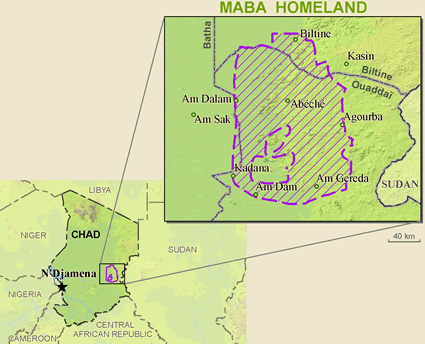The Maba, sometimes called the "Burgu," are the dominant people group of the Wadai Mountains which are located in eastern Chad. Several thousand Maba also live as immigrants or refugees in neighboring Sudan. The Maba are Chad's largest non-Arab Muslim group. The term Maba is actually a collective term used to describe the mountain tribes in Wadai into which other ethnic groups have been assimilated. There are various Maba subgroups, including the Marfa, the Djene, and the Mandaba tribes, all of which speak the same language. This language is called Maba, or Mabang. Maba is closely related to the Masalit and Runga languages. Many of the Maba also speak Arabic as a secondary or trade language.
Long ago the Maba overthrew the Tunjur dynasty in Wadai and formed the backbone of the Wadai Empire which dominated eastern Chad in the 1800s. In modern Maba society, chiefs and members of royal clans still possess a high degree of prestige and power.
The Wadai region, home of the Maba, is hot and dry most of the year. Broad flat grasslands and plateaus characterize the area. Elephants, antelopes, giraffes, and lions are among those animals that co-exist with the Maba and other neighboring tribes.
The Maba are primarily farmers who raise millet and wheat as their staple crops. Horses, cattle, goats, sheep, and chickens are raised for their milk, butter, wool, eggs, and meat. They are also used for trade in the markets, as well as for animal sacrifices.
Livestock production is another important economic activity for the Maba, and markets are widespread places of trade. Although the women help the men work in the fields, the men alone are responsible for clearing the land and doing other heavy work. The men also tend the animals, trade at the local markets, and make important family decisions. The women are responsible for milking the animals, brewing beer from millet, and preparing a daily millet-based porridge. They also keep up with the domestic duties such as caring for the children.
Some of the Maba live in large towns. There, they live in huts that are clustered tightly together. Many others live in compact rural villages. Their huts are grouped into compounds surrounded by grass mat fences. The huts are usually made of straw with high, peaked roofs and are reserved for sleeping and storing grain. Other community activities, such as dances or local assemblies, take place either in the courtyards or in the central square. The village mosque and a straw-roofed pavilion for the elders are also located in the central square.
The sultan's palace is situated in the capital town for the area, Abeche. The sultan serves as head of the state and rules and directs the people through governors, district chiefs, and various other officials. He is usually the son of a Maba woman called the "Queen Mother" (the widow of the previous monarch). This woman has high status and great influence among the Maba.
Maba marriages generally take place between a man who is in his 20s and a woman who is in her late teens. They permit polygamy; however, men can have no more than four wives in accordance with Islamic traditions. When a couple marries, they usually live with the bride's family for two years, after which time they move into their own newly built house. A man's first wife acts as the "chief" over any additional wives. Only the first wife lives with the husband in his house. The others live in their own separate huts.
Unlike cultures that assimilate the ways of their conquerors, historically, the Maba were not weakened by invasions, remaining a dominant people. These rural people have about 600 villages today.
The Maba, like most other tribes in the area, are a Muslim people. According to the Islamic faith, Allah is viewed as the sole creator and restorer of the world. Islam teaches that man's goal is to submit to the will of Allah which is made known through the scriptures in the Koran. Muslims believe that Allah gave these sacred writings to his messenger, the prophet Mohammed.
By the law of the Koran, a Muslim must follow certain guidelines. For instance, marriages are strongly encouraged, children are to treat their mothers with tenderness, and chastity in women is considered to be of prime importance.
At the present time, the Maba tribes of Sudan and Chad have few Christian resources available to them. The Maba need audio Scripture resources distributed in their communities. They especially need prayer so that the subtle deceits of humanity's unseen enemy will be unmasked and that the Maba people will find the truth of salvation through the Christ's redemptive work on the cross.
Pray for the Lord to bless the Maba in practical ways and that they will understand that He loves them and wants them to become part of His family.
Pray for the Lord to thrust out workers into the Maba harvest.
Pray for Maba leaders to open the door for Christ to bless their families and communities.
Pray for a powerful movement to Christ among the Maba this decade.
Scripture Prayers for the Maba, Borgu in Sudan.
| Profile Source: Joshua Project |












